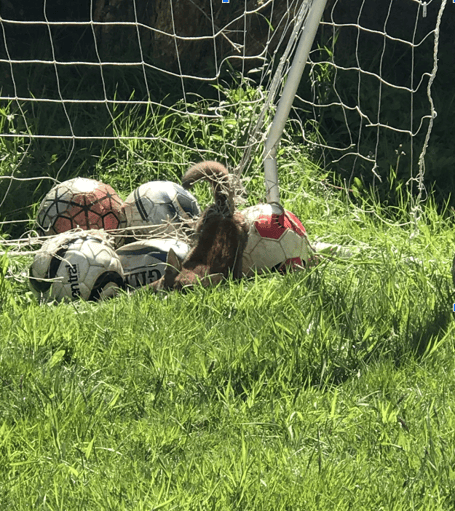RSPCA Cymru is renewing its warning about the dangers to wildlife of netting as figures reveal more than 100 incidents in Wales were reported to the charity last year.
The problem shows no sign of abating in 2023 - with charity’s animal rescuers called to an incident last month following a call from concerned members of the public after a gull was seen trapped by roof netting.
Of all wild mammals, foxes and hedgehogs are the most likely to become tangled in netting.
In 2022, the RSPCA took a total 1,798 calls - with 105 these from Wales - relating to all species of animals which had become entangled in netting. Across England and Wales, 315 of these calls related to wild mammals and included 167 foxes and 62 hedgehogs.
The RSPCA received three incidents involving animals of any kind entangled in netting in Powys from 2022.
Cardiff had the most reports across Wales last year with 27, with Denbighshire next with 22 and then Conwy with 13.
The charity is now in a very busy period; where inexperienced and curious young animals venture out and about for the first time. Already this year in just one single week in April, the charity’s records showed that as well as the sad death of the entangled fox cub in South London, ten other cubs were thankfully rescued unharmed from nets.
RSPCA inspector Christine McNeil was called to Chepstow Road in Newport after a pigeon had become trapped in netting on the front of the roof on Friday 2 June. South Wales Fire and Rescue Service’s White Watch of Maendy Station attended to help the charity - and the pigeon was successfully removed from the netting.
Christine said: “The pigeon who had netting around his leg luckily didn't have any obvious injuries and following some care at a wildlife rehabilitation centre has been released.
“The property owner for the second floor is unknown so we have advised others in the building that the owner needs to have the netting removed or repaired.”
Elsewhere, South Wales Fire and Rescue Service’s White Watch of the Cardiff Central Station came out to assist a gull caught in roof netting of a three storey building off Windsor Place in Cardiff city centre on Thursday 11 May - following a call to the RSPCA on the same day.
RSPCA deputy chief inspector Gemma Black said: “Thanks to the expertise of the fire service using their aerial ladder platform they managed to get the gull free.
“Sadly however after taking the gull to the emergency vets nearby it was found to have a fracture in one of its wings so they humanely put the bird to sleep on welfare grounds.
“Although this was not the happy ending we had hoped for, we’d like to thank those who reported this to us and to the fire service for rescuing the gull to end his entrapment. The gull would have been very frightened being trapped amongst the netting.”
RSPCA Cymru is now hoping to spread the message about the dangers that everyday netting - from roof netting to football goals - pose to the wildlife who share our communities. This time of year is the busiest for the charity when it comes to animals caught in netting - so the charity fears another influx of calls is coming without community action.
Putting netting away after use to prevent wild animals getting entangled is just one of the many things volunteers can do to help our native wildlife.
In May 2021, a fox became caught in football goal netting in a back garden in Swansea.
RSPCA animal rescue officer Paula Milton was able to keep the cub calm by covering him in a big blanket, before she cut him loose from the netting.
Fortunately, despite the ordeal, the cub was fine - and the fox's mother was in the garden so he could be immediately released back to the wild. But the incident served as another reminder as to the dangers of unattended football netting.
RSPCA scientific officer Evie Button said “It’s really important that people understand how lethal football netting can be and how often these incidents happen - particularly at this time of year, when the curiosity of young, inexperienced animals gets them into potentially deadly situations.
“We’re urging the public to help us spread the message - remember to put your sports netting away after use and never leave it unmonitored, particularly overnight.”
The RSPCA also receives countless reports about wild birds trapped in or behind netting from roofs and bridges - with a large number of these involving bird-deterrent netting.
Evie added: “Problems arise when netting is put up incorrectly or becomes damaged, leaving gaps where birds can enter and become trapped, leaving them susceptible to a long and painful death from injury or starvation.
“Unfortunately bird-deterrent netting is often fixed in high or hard-to-reach areas, making the rescue of trapped animals difficult and dangerous. We would urge businesses and those who use netting as a deterrent to ensure the netting is kept well maintained with no gaps that can lead to birds entering.
“Getting tangled up in netting is very stressful for an animal. And if the animal gets seriously entangled, netting can cause severe injuries or - as seen recently - even death.
“As wild animals frequently get trapped during the night, they may have been struggling for many hours by the time they are found and often need veterinary attention and sedation to cut them free.”
The charity’s warning about the dangers of netting to wildlife comes after the RSPCA showcased its inspiring wildlife sanctuary garden at the prestigious RHS Chelsea Flower show last month, complete with tips on the little things people can do to help wildlife.
RSPCA officers have also been urging the public to sign-up as Wildlife Friends to undertake small acts of kindness in their community towards wild animals - such as putting away netting after use.
Evie added: “We were proud to be at the Chelsea Flower Show this year, with our garden all about inspiring the public with ideas they can easily recreate at home to create small wildlife sanctuaries right across the country.
"Wildlife is under threat in Wales and beyond – but we all have the power to change that. Together, we can ensure more animals thrive."
For advice on what to do if you see a wild animal in distress, please visit the RSPCA’s website.
To help the RSPCA continue rescuing, rehabilitating and rehoming animals in desperate need of care please visit our website or call our donation line on 0300 123 8181.

.jpeg?width=209&height=140&crop=209:145,smart&quality=75)



Comments
This article has no comments yet. Be the first to leave a comment.